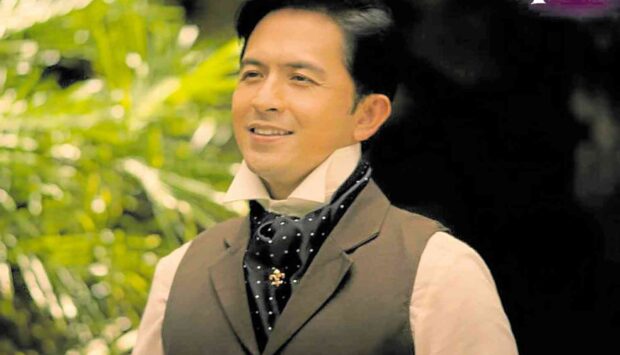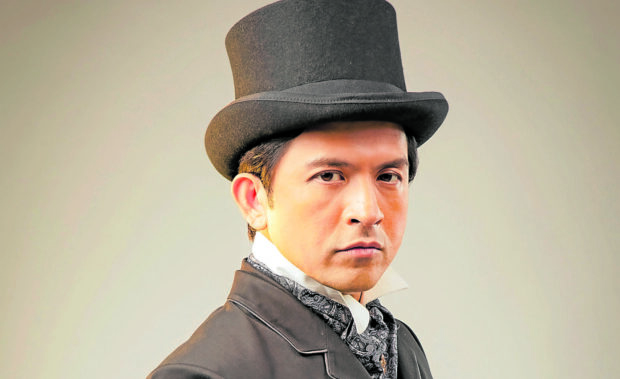By his own admission, Dennis Trillo didn’t put much effort into reading Rizal’s novels back in high school. He saw “Noli Me Tangere” and “El Filibusterismo” merely as required readings to pass Filipino subjects.
That’s why when GMA 7 offered him the role of Crisostomo Ibarra for the portal drama-fantasy series “Maria Clara at Ibarra (MCAI),” he had a few misgivings.
“I gave it some thought at first. ‘Would I be able to give justice to such a big and important role?’ I wondered. I didn’t know Ibarra well enough because I wasn’t keen on reading ‘Noli’ and ‘El Fili’ when I was a student,” he told the Inquirer in a recent Zoom interview arranged by his new management, Aguila Entertainment.
“Many of us didn’t find the books interesting—parang boring ang dating. They were written in deep Tagalog words. They didn’t have photos, so it was hard for us to imagine,” he recalled. “So I was like, ‘Will I be able to do the role?”
But in the end, the potential and magnitude of the project was too hard to resist.
“Later on, I realized that it was one of the network’s biggest shows last year. And if ever, Ibarra could end up being a role of a lifetime—if done right,” Dennis said. “That was it. Naging mas matimbang sa ‘kin na ayoko siyang pakawalan. I figured that it would also be a good opportunity for me to study the novels again. I also wanted to see what kind of effect it would have on my career.”
Second chance
Another fact that made the project more intriguing for the 42-year-old actor was the incorporation of fantasy and comedic elements into the narrative, which made it more appealing to a younger audience.
Directed by Zig Dulay, “MCAI” follows Klay (Barbie Forteza), a graduating nursing student seeking greener pastures abroad. Her dreams hang in a balance, however, because of a failing grade in Rizal studies.
Klay’s professor gives her a second chance and asks her to write a book review of “Noli.” Little does she know, the copy handed to her will magically transport her to that world. There she meets Ibarra as she immerses herself in life during the Spanish colonization.
“I became even more curious because of the treatment. If it were straight storytelling without a Gen Z character, most people might have found it boring. Some have already read the novel, so they may think that there’s nothing to watch out for. But the introduction of the Gen Z character made us wonder how the original characters would interact with her, what kind of dialogue they would have,” he said.
Dennis expected that that role would test his mettle as an actor. He knew that he would have to work hard for it and that he can’t afford to do anything half-baked.
And so, he made the necessary preparations: He reread the novels and took up Spanish language lessons. He also watched past adaptations of “Noli” by two National Artists: Eddie Romero’s 1993 television special, starring Joel Torre; and Gerardo de Leon’s 1961 film starring Eduardo del Mar.
“Their approach to character was different. There are a lot of references available, but I didn’t want to copy what they did. As an actor, you want to have your own input regarding the style and come up with your own version,” Dennis said. “What the other actors did was difficult. I got ideas from their performances that helped me build my own portrayal.”
‘Youthful and idealistic’
His styling of Ibarra, for one, is different. “Ibarra is a representation of Rizal. And most of the past Ibarras did look undeniably like Rizal. But here, we didn’t give him a mustache. He had just retired from Europe and was in his early 20s. And we wanted him to look more youthful and idealistic. He had angst, but it didn’t show outside,” Dennis said.
It has been about four months since the hit and critically acclaimed show ended. And looking back, Dennis couldn’t help but find newfound appreciation for Rizal’s courage and genius.
“The way Rizal created the characters … they all felt so alive—Padre Salvi, Padre Damaso, Don Tiburcio, etc. The actor just needs to read, understand the character and his relationship with other characters,” Dennis said.
“Rizal was ahead of his time when he wrote the novels. He was one of the few people who had the courage to put out this kind of story—a story that helps us realize that we should learn from history and not repeat past mistakes that were depicted,” he said.
Succeeded in its goal
It’s very heartening to see, Dennis said, that “MCAI” has succeeded in its goal to entertain and educate. Because of the show’s reach and appeal, a lot of young viewers had taken an interest in reading them.
Even his 15-year-old son Calix who happened to be studying “Noli” in school watches the show.
“It’s amusing because he watches it, so at least he knows how the story goes, as well as the symbolisms … It’s much easier for him to visualize what happens in the books. And it’s great that the show can be easily accessed by people who want to learn,” Dennis said of the show, which has been in Netflix’s Top 10 titles in the Philippines for the past eight weeks (five of which were spent in the No.1 spot).
Years from now, kids who tuned in to “MCAI” will pick up “Noli” and “El Fili” and probably visualize Dennis when they see the name Ibarra. “That would be a nice feeling, should that happen. Being identified with such an iconic character is hard to achieve. That would be an honor,” he said. INQ



